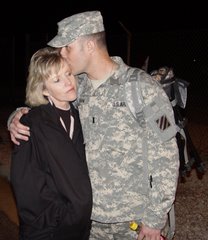 Lt. Col. John Kolasheski, from Louden, Tenn., the commander of 3rd Squadron,1st Cavalry Regiment, talks with local leaders about the concerned citizens program and solicits their help at a meeting in Besamaya, Oct. 20.
Lt. Col. John Kolasheski, from Louden, Tenn., the commander of 3rd Squadron,1st Cavalry Regiment, talks with local leaders about the concerned citizens program and solicits their help at a meeting in Besamaya, Oct. 20. Following a meeting to discuss the concerned citizens program, Capt. Troy Thomas, from Litchfield, Minn., the commander of Troop A, 3rd Squadron, 1st Cavalry Regiment, talks with people in Besamaya, Oct. 20.
Following a meeting to discuss the concerned citizens program, Capt. Troy Thomas, from Litchfield, Minn., the commander of Troop A, 3rd Squadron, 1st Cavalry Regiment, talks with people in Besamaya, Oct. 20.By Spc. Ben Hutto
3rd Brigade Combat Team Public Affairs
FORWARD OPERATING BASE HAMMER, Iraq – Sunnis and Shias are banning together in Besamaya and establishing a concerned citizens program in their area.
The chairman for the Mada’in Qada, the Jisr Diyala city manager, a Jisr Diyala councilman and approximately 50 local sheiks listened to the success stories of concerned citizens programs in a surrounding area, Oct. 20.
Abu Ammosh, the leader of the concerned citizens in Al Khargulia outlined the benefits of the concerned citizens program in his area and asked for their cooperation.
“As a Sunni, I am happy to see Shia people fighting al-Qaida and Shia extremists with us,” said Ammosh through an interpreter. “Both sides are now fighting the same enemy. Four years ago there was a separation of the people in the area and we lived in a bad situation. We must accept what has happened, but then come together and become one body.”
Abu Ammosh explained to the sheiks that his program, comprised of both Sunni and Shia citizens, has limited insurgent activity in his area and made the local residents feel safer.
Capt. Troy Thomas, Litchfeild, Minn., the commander of Troop A, 3rd Squadron,1st Cavalry Regiment, explained that the concerned citizens program in Khargulia is a good example of how effective the groups can be.
“The concerned citizens (program) is seen by the locals as a way to take control of their neighborhoods,” said Thomas. “For four years the people in Khargulia felt like their hands were tied. It is human nature to want to defend your neighborhoods, your family and your livelihood. Every neighborhood in our AO (area of operation) that has one (CCP) is doing well. The areas that don’t have one want one.”
Lt. Col. John Kolasheski, from Louden, Tenn., the commander of 3-1 Cav. Regt., informed local leaders about the program and solicited their participation. He explained that the meeting will allow him and 3-1 Cav. Regt. leadership to get names of leaders in each area for a follow-up meeting to discuss strategies for securing critical infrastructure and improving security in the area.
Kolasheski pointed out that as the area becomes more secure, the 3rd Brigade Combat Team would be able to resource contractors to restore essential services and create employment opportunities.
Kolasheski explained that the Besamaya area has several factors that could make it a Shia extremist sanctuary. According to Kolasheski, the area is located on the Al Kut Highway, which could be used to smuggle weapons and fighters into Baghdad from the Diyala province in the north or Iran from the southwest. He further explained that very few Iraqi security forces patrol the area and a brigade high-value individual was recently detained in Besamaya.
“It is very important tribal leaders, government leaders and security leaders work together so we can ensure that the area is moving forward,” Thomas said. “Terrorists are a step backward. After a while, the terrorists will have nowhere to go and the good people of Iraq will have their country back.”
Kolasheski is confident that Sunnis and Shias can work together to improve the area.
“There are things you can do to help the people in your area and the people of Iraq,” Kolasheski told the citizens in attendance. “I do not care if you are Sunni or Shia. This program represents the bridging of the divide between you. It represents security in some areas. Once you are secure we can start concentrating on economic and governmental improvements.”
The 3-1 Cav. Regt., is assigned to the 3rd BCT, 3rd Infantry Division, from Fort Benning, Ga., and has been deployed in support of Operation Iraqi Freedom since March.





No comments:
Post a Comment